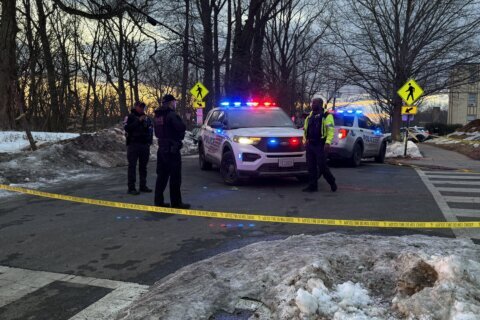The troubled D.C. crime lab is getting another probing: This time by the Office of the D.C. Auditor, which will review how the Department of Forensic Sciences responded over the past year to complaints of errors and misconduct in its forensic work.
An Aug. 6 letter from D.C. Auditor Kathy Patterson to interim DFS Director Anthony Crispino said her office will conduct a six-month audit to see whether the lab complied with the decade-old law creating the independent forensic agency, specifically related to how disputes and errors are handled.
The letter was first reported over the weekend by D.C. journalist Sloane Airey.
In an interview with WTOP, D.C. Auditor Kathy Patterson said her office will take a hard look at the 2011 D.C. law creating the city’s independent forensic lab, which came just a few years after a groundbreaking 2009 report from the National Academy of Sciences that urged the splitting off of forensic labs off from police departments and prosecutors’ offices in the name of better science.
“We’re looking at the legislation that created the Department of Forensic Sciences,” Patterson said in an interview with WTOP, “to see whether the provisions of the legislation have been implemented effectively.”
If not, she said her office would make recommendations for improving the lab and strengthening its independence based on what D.C. lawmakers envisioned when they created the agency as well as industry best practices.
For more than a year, the D.C. forensic agency has been locked in a rancorous back-and-forth with the U.S. Attorney’s Office for D.C. In early 2020, federal prosecutors discovered firearms examiners at the lab erroneously linked cartridges from two different crime scenes to the same gun in a case they were prosecuting that was headed to trial.
The lab resisted acknowledging error, at first, and prosecutors, along with the D.C. Office of the Attorney General, then retained a team of experts to more deeply probe the lab’s firearms unit. Those experts uncovered what they called serious management failings, including that senior leaders at the lab concealed conflicting findings in the murder case and may have pressured analysts to reach certain conclusions.
The allegations roiled the lab and led to its loss of accreditation and the resignation of the former agency director. D.C. officials, including Muriel Bowser, however, also sought to emphasize what they saw as federal prosecutors’ role in the lab’s troubles. In a letter, Bowser criticized prosecutors for conducting their own audit of the lab instead of following the lab’s procedures.
Patterson’s audit is only the latest inquiry into the lab’s problems.
Following the loss of accreditation, the city hired forensic consulting firm SNA International to conduct what agency leaders have described as a “top-to-bottom” review of the lab with an eye toward regaining accreditation.
The city signed a $764,000 contract with the company to “assess and document all current DFS operations,” including lab management, quality practices, and procedures and practices, to identify the root causes that led to the loss of accreditation, according to a copy of the solicitation obtained by WTOP through a D.C. Freedom of Information Act request.
There is also an apparently still-ongoing criminal investigation being conducted by the D.C. Office of the Inspector General. Court documents reveal the IG has been conducting interviews related to that investigation as recently as late June, although the status of the investigation is unclear.
Patterson said she is aware of the other audits and investigations, but that her office’s review is unique.
“It’s important to make sure that when there are multiple reviews going forward, that nothing is missed … nobody else is looking at the law, itself.”
For example, the probe will zero in on the process laid out in the D.C. statute for investigating errors.
By law, “any allegation of professional negligence, misconduct, or misidentification or other testing error” must be immediately reported to the lab’s independent panel of forensic experts, the Science Advisory Board. More significant issues are required to be investigated by a third party.
However, the law as currently written has been criticized by some as placing too much discretion in the hands of the agency director. Only allegations that the director determines are “credible and substantial and that may substantially affect the integrity of the results of forensic analysis” are required to be investigated by an outside party.
At a D.C. Council oversight hearing in April, an attorney at the D.C. Public Defender Service testified that the independent panel of scientists had been “thwarted by DFS practices that have minimized the reporting of information … and by a management culture that hid errors and intentional misconduct.”
The Public Defender Service called on the D.C. Council to rewrite the legislation to strengthen the science panel and limit the power of the agency director in investigating the agency’s own errors.
Patterson said her office’s audit will be taking a look at the Science Advisory Board as part of its review.
“Has it lived up to its own goals and expectations for being one of the ways in which forensic lab independence is assured?” Patterson said. “Has it lived up to that intent and that billing?”
Amid all the turmoil at the agency, three positions on the nine-member board — a third of its members — are currently vacant.
For now, Patterson said her office’s audit will focus on the lab’s operations over the past year, from October 2020 to May 31, 2021. The scope could change as the auditing team learns more, she said.
Like the inspector general, the auditor has broad authority to review D.C. agencies, including subpoena power and the right “to inspect every document in the District government,” Patterson said.
The office’s authority, however, does not extend to federal agencies, although Patterson said her office will be reaching out to the U.S. Attorney’s Office.








